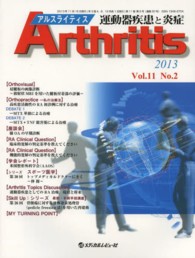- ホーム
- > 洋書
- > ドイツ書
- > Humanities, Arts & Music
- > Psychology
Full Description
This book focuses on systems engineering, systems thinking, and how that thinking can be learned in practice. It describes a novel analytical framework based on activity theory for understanding how systems thinking evolves and how it can be improved to support multidisciplinary teamwork in the context of system development and systems engineering. This method, developed using data collected over four years from three different small space systems engineering organizations, can be applied in a wide variety of work activities in the context of engineering design and beyond in order to monitor and analyze multidisciplinary interactions in working teams over time. In addition, the book presents a practical strategy called WAVES (Work Activity for a Evolution of Systems engineering and thinking), which fosters the practical learning of systems thinking with the aim of improving process development in different industries. The book offers an excellent resource for researchers and practitioners interested in systems thinking and in solutions to support its evolution. Beyond its contribution to a better understanding of systems engineering, systems thinking and how it can be learned in real-world contexts, it also introduce a suitable analysis framework that helps to bridge the gap between the latest social science research and engineering research.
Contents
Part I Introduction of the research project.- Part II Analysis and findings of the empirical studies.- Part III Results, intervention, and contributions.








